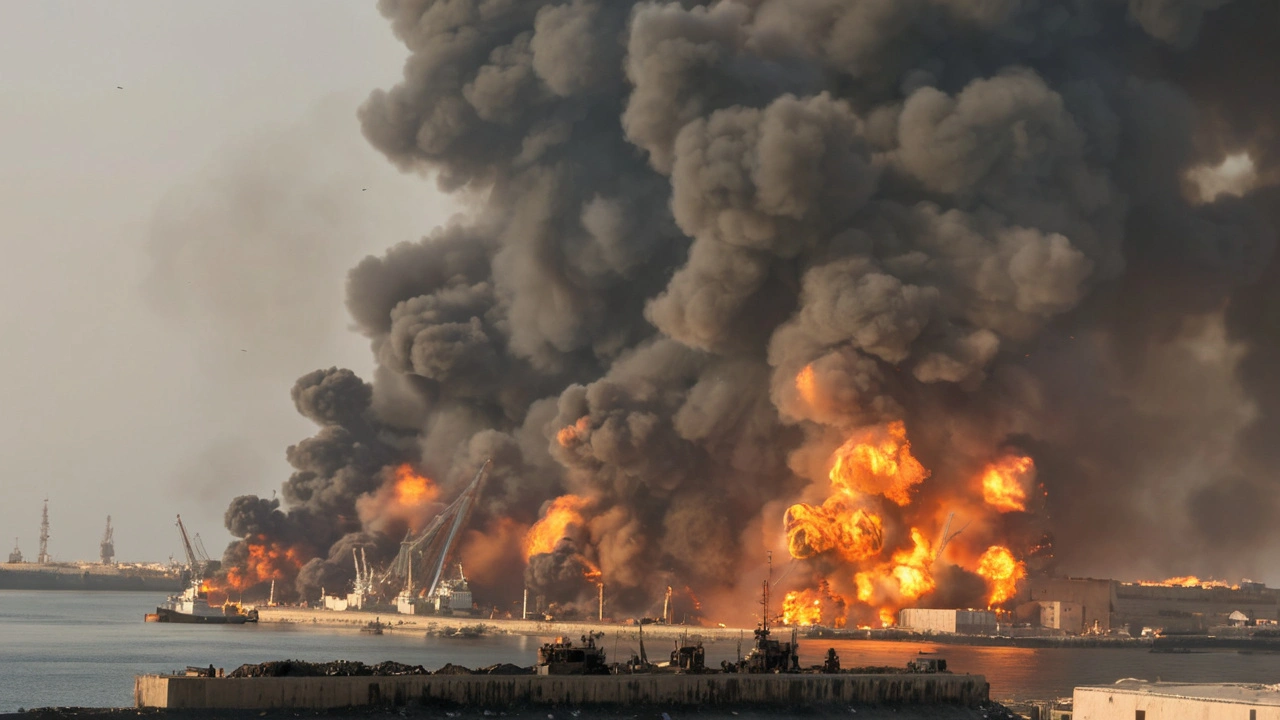Israel Conducts Air Strikes on Yemen's Hodeidah Port in Response to Houthi Attacks
In a dramatic escalation of regional tensions, Israel has launched air strikes on the Yemeni port city of Hodeidah. The operation was a direct response to ongoing attacks by the Houthi group, which have increasingly targeted Israeli territories. According to reports, the air raids resulted in the death of six individuals and inflicted notable damage on critical infrastructure, including oil storage facilities and a power plant. This surge in hostilities follows a Houthi drone attack that killed one person in Tel Aviv just a day prior.
Details of the Attack
Eyewitness accounts and local media outlets described the scenes in Hodeidah as catastrophic. The Houthi-affiliated Al Masirah TV reported that the air strikes not only targeted oil storage facilities but also hit a power plant. The implications of these attacks extend beyond the immediate loss of lives to potential long-term disruptions in energy supplies for the embattled region. The Israeli military, however, defended its actions, asserting that their targets were of a military nature, aimed at crippling the Houthi's capacity to launch missiles and drones.
The Houthi’s Retaliation and Strategic Objectives
The recent bout of violence is part of a broader campaign by the Houthis to put pressure on Israel amid its ongoing war in Gaza. The Houthis, who are allied with Iran, have increasingly targeted critical shipping lanes in the Red Sea and launched several ballistic missiles and drone attacks toward Israeli territory. Although many of these attacks have been intercepted, the persistence and escalation underline the growing capabilities and ambitions of the Houthi movement. Their objectives appear clear: to compel Israel to divert military resources away from Gaza and stretch its defensive capabilities.
International Reactions
The international community has been closely monitoring these developments with increasing concern. Defense Minister Yoav Gallant of Israel made a stern vow to 'settle the score' with any entity threatening Israel's security, signaling that this could be the beginning of more intensive military actions. The United States and the United Kingdom have also been active in the region, conducting air strikes aimed at neutralizing the Houthi's offensive capabilities. However, despite these interventions, the military campaign has yet to yield substantial results, as the Houthi group continues its assaults unabated.
Historical Context
The origins of this conflict are deeply rooted in decades-long rivalries and geopolitical struggles. The Houthi movement, which primarily consists of Zaidi Shia Muslims, has been in conflict with the internationally recognized government of Yemen, which is backed by a Saudi-led coalition. This coalition includes the United States and the United Kingdom, among others. Israel's recent involvement adds a complex new layer to this already tangled web of alliances and hostilities. Historically, Israel and Iran have been at odds, often engaging in proxy wars to assert dominance in the Middle East. The Houthis, as Iranian allies, represent another front in this enduring regional struggle.
Humanitarian Implications
The human cost of this conflict is staggering. Yemen has already been grappling with one of the world's most severe humanitarian crises, exacerbated by years of relentless fighting. The recent air strikes on Hodeidah have made the situation even more dire. Humanitarian organizations have long warned that any disruption to vital infrastructure, like power plants and oil storage facilities, could push more civilians into extreme poverty and starvation. Furthermore, the targeting of such infrastructure deepens the cycle of violence and retaliatory attacks, making any potential for peace increasingly elusive.
The Road Ahead
As the dust settles after these recent air strikes, one thing is clear: the conflict is far from over. Both Israel and the Houthi movement appear committed to continuing their hostilities. For Israel, the goal is to neutralize the threat to its borders and its people. For the Houthis, the objective is to leverage their attacks to extract political and military concessions. The international community remains on edge, watching for any signs of escalation that could impact global shipping lanes and regional stability. Diplomatic efforts will likely intensify in the coming weeks as stakeholders on all sides search for ways to de-escalate the situation.
Conclusion
The recent Israeli air strikes on Hodeidah mark a significant turning point in the already convoluted Middle Eastern landscape. As both sides prepare for what could be an extended period of hostilities, the world watches with bated breath, hoping for a resolution that will bring lasting peace to a region long plagued by war. The human toll of this conflict continues to climb, and the need for a diplomatic solution has never been more urgent. Stakeholders and international mediators must act swiftly to prevent further loss of life and to pave the way for lasting peace.






